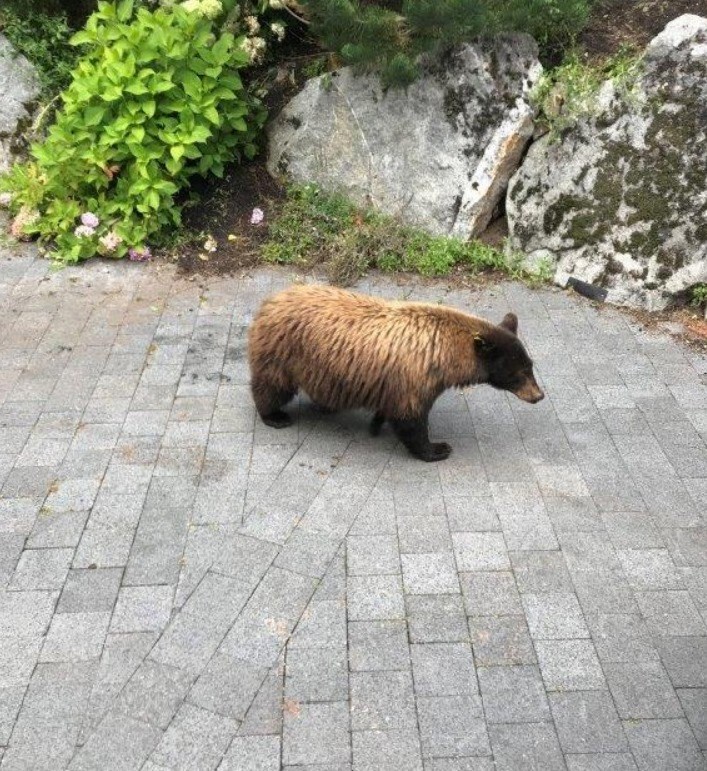A Whistler woman who was fined $60,000 this fall for her role in feeding black bears from her Kadenwood home has successfully appealed her sentence and had her fine significantly reduced.
On Dec. 1, Zuzana Stevikova, who pled guilty early in the proceedings, was ordered to pay a lowered fine of $10,500, according to court documents.
The investigation was launched in July 2018 after the Conservation Officer Service (COS) received an anonymous complaint claiming that residents of the neighbourhood had been deliberately feeding bears “for a considerable amount of time.”
A sow and two cubs that were fed in Kadenwood were later killed by the Crown agency in September 2018 after displaying “very troubling” behaviour on the scene, conservation officers said at the time.
Local grocery clerks interviewed by the COS said Stevikova and her partner, Oliver Dugan—whose charges were eventually stayed—purchased up to 10 cases of apples, 50 pounds of carrots and 15 dozen eggs on a weekly basis. Witnesses, most of whom worked in the area, reported to investigators seeing apples or carrots “strewn about” on different parts of the property, with often up to five bears observed onsite at a time. They also overheard Stevikova calling the bears by name.
The COS called the initial $60,000 fine handed down in late September the highest overall penalty ever imposed under B.C.’s Wildlife Act. According to Justice J. Miriam Gropper, the steep fine—which was nearly six times the amount proposed in the original joint submission by the Crown and defence—did not align with penalties handed down for similar offences in the past.
In the relatively rare joint submission, the Crown and defence counsel had earlier asked for a smaller $10,000 fine to be imposed, which took into consideration, among other factors, Stevikova’s early guilty plea, her high moral culpability and the number of days the offences took place. Ultimately, sentencing judge Lindsay Smith found the amount didn’t satisfy the public interest, justifying the harsh penalty, in part, due to the deliberate and repeated nature of the offences and the risk posed to both the bears and the public.
In striking down the earlier sentence, however, Gropper said the sentencing judge failed to properly apply the necessary principles from the applicable case law, and “made findings of fact which were not supported by the agreed statement of facts, would be difficult for the Crown to prove, or were not based on evidence but rather her own judicial notice. She then fashioned a sentence based on her extrapolation of the facts before her.”
In Gropper’s analysis of the Crown’s case, she noted “a lack of direct evidence about whether the bears that were euthanized were fed by Ms. Stevikova,” adding that “witnesses were vague and potentially unavailable,” and that the evidence was impacted by the amount of time between the witnesses’ statements to conservation officers and the subsequent trial.
Furthermore, while the Crown pointed out that the evidence showed Stevikova’s bear-feeding was likely limited to three or four days, sentencing judge Smith considered her actions “deliberate and planned and that she repeated the offending behaviour throughout the summer of 2018,” the court documents read.
The “overwhelming theme” in the reasons for Smith’s initial judgement, Gropper wrote, was “the foreseeability of the bears being euthanized as a result of Ms. Stevikova’s actions,” particularly given the signage and messaging found around Whistler advising that “a fed bear is a dead bear.”
The Crown’s submissions, however, made clear that taking judicial notice of this messaging was wrong because the death of the bears “is not necessarily always the outcome of COS intervention.”
According to the court proceedings, Stevikova noticed the bears “looked skinny” and, by feeding them, believed she was preventing the public from calling the COS, which she thought would ultimately lead to their deaths.
Gropper, in striking down the initial penalty, said overriding a joint submission on sentencing can only be done in specific circumstances.
The legal threshold for doing so is that a judge finds the proposal "so unhinged from the circumstances of the offence and the offender" that it would cause reasonable, objective observers to "believe that the proper functioning of the justice system had broken down."
Gropper found that this strict criteria was not met in this case.
Following the successful appeal, the majority of Stevikova’s reduced fine—$9,500—will go to B.C.’s Habitat Conservation Trust Foundation. She had also previously donated $5,000 to the Get Bear Smart Society shortly before her court proceedings began.




